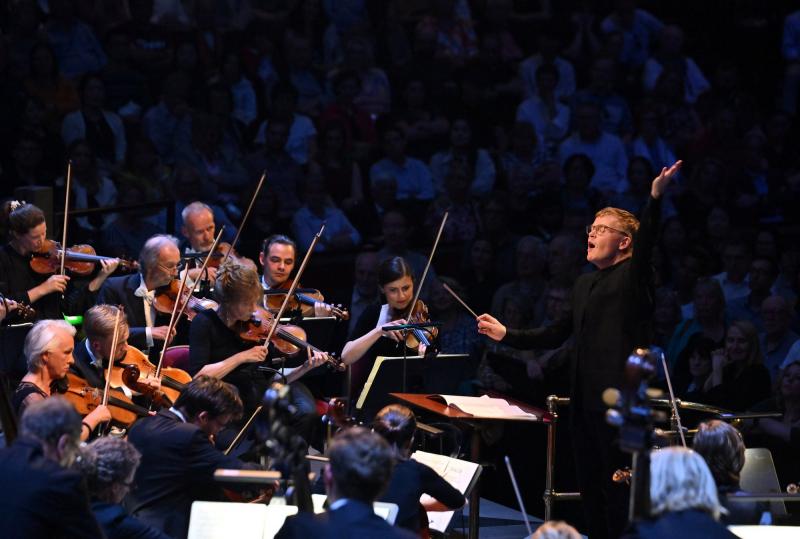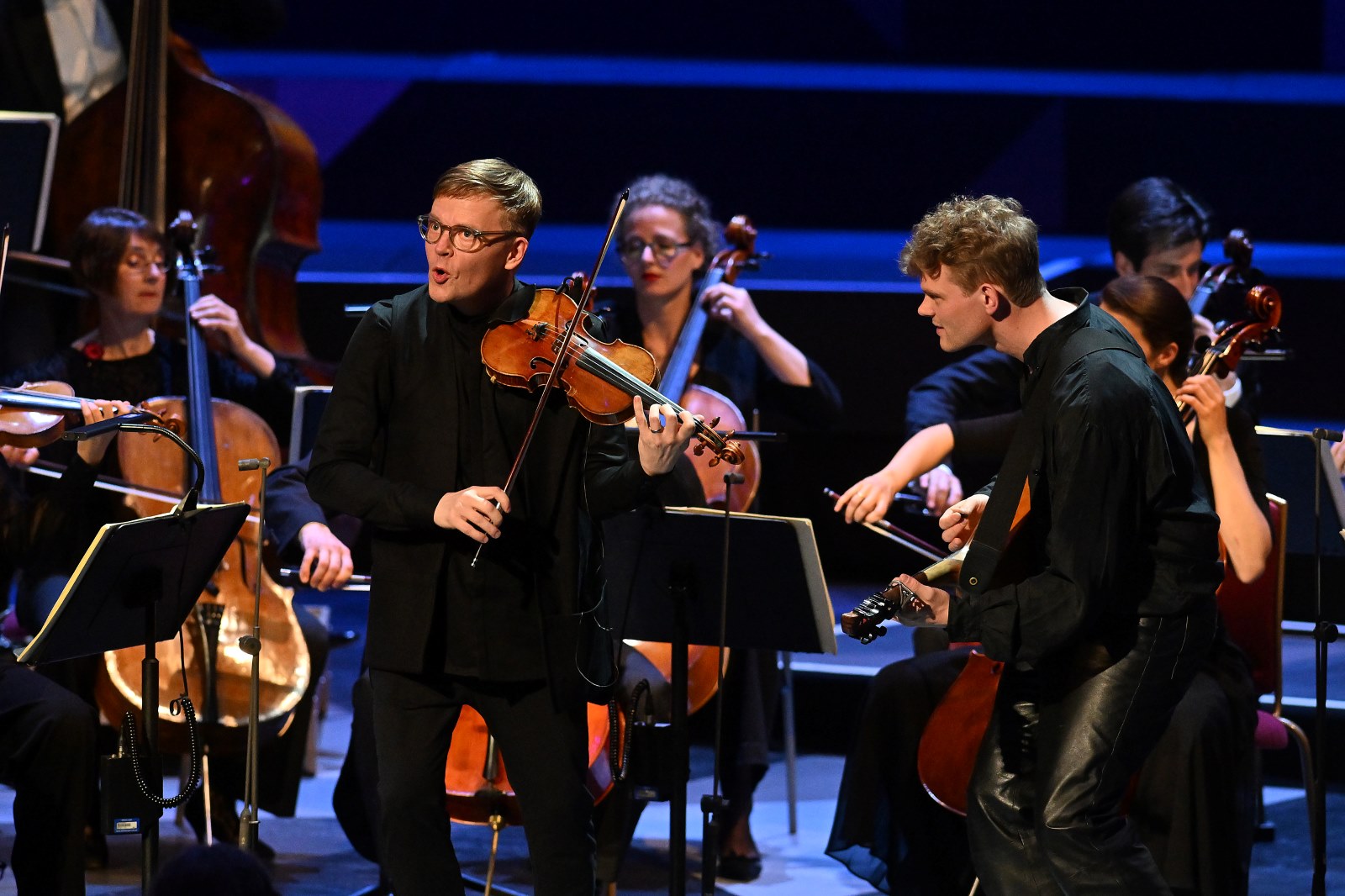Prom 4: Deutsche Kammerphilharmonie Bremen, Kuusisto review - Pekka Kuusisto's charisma shrinks the Royal Albert Hall | reviews, news & interviews
Prom 4: Deutsche Kammerphilharmonie Bremen, Kuusisto review - Pekka Kuusisto's charisma shrinks the Royal Albert Hall
Prom 4: Deutsche Kammerphilharmonie Bremen, Kuusisto review - Pekka Kuusisto's charisma shrinks the Royal Albert Hall
Vivaldi 'refreshed', as the celebrated violinist inspires as conductor with belief and vision

Pekka Kuusisto, making his Proms debut as conductor in the first half of this concert, and then as violinist/conductor/ringmaster/energiser in the second, brought lightness, playfulness, and a Finnish sense for the absurd to the Albert Hall. He is an absolutely live-wire performer and has a hugely charismatic musical presence. He radiates joy in his craft and also unfailingly communicates his appreciation for those around him.
Lightness and a sense of the dance were certainly there in Beethoven’s Symphony No. 1. Recent recordings of the Carl Friedrich Ebers chamber ensemble version of this work have served as a reminder of how joyous and fleet-footed it can sound; this performance managed to do exactly the same, but with larger forces. The scurrying first violin part of the trio of the third movement scherzo was absolutely breathtaking. The first violin section, led by the remarkable German violinist Daniel Sepec is such a strong unit, and their unanimity at fast tempi really is something special.
The Beethoven performance had one fascinating and surprising break with tradition. The six-bar adagio opening to the fourth movement was transformed into a call and response with the orchestra singing it, and then the Royal Albert Hall audience singing it back – complete with dynamics. Did it work? It certainly served to involve the audience and enable Kuusisto to "shrink the room", which in the cavernous Albert Hall is no mean feat.
Increasing playfulness was the hallmark of the opening work of the concert. Swedish composer Andrea Tarrodi’s Birds of Paradise II starts with an evocation of calm and serenity, and increasingly starts toying the idea of more or less all of the instruments of the orchestra imitating the sounds of nature – and of birdsong in particular – as closely as possible. It’s not all deadpan... when a bassoon joins in it probably never is. From the oboes, we heard the sound of breath, and from Jonas Krause, the same percussionist who would later give us precise, crisp and tight timpani work in the Beethoven, here we heard a wonderfully sustained and atmospheric shimmer on the cymbal. The TV recording of the concert inserts nature footage in the piece, so the birds of paradise are actually seen rather than just imagined from the instrumental sounds.  The second half of the concert was Vivaldi’s The Four Seasons, variously described in the programme as having been “refreshed” or as “interspersed with folk music improvisations”. There were some particularly stunning moments when Kuusisto was working in close cahoots with Daniel Sepec, who was leading the first violins, and Latvian violinist Marta Spārniņa, leading the seconds. Fabulous.
The second half of the concert was Vivaldi’s The Four Seasons, variously described in the programme as having been “refreshed” or as “interspersed with folk music improvisations”. There were some particularly stunning moments when Kuusisto was working in close cahoots with Daniel Sepec, who was leading the first violins, and Latvian violinist Marta Spārniņa, leading the seconds. Fabulous.
Kuusisto takes the approach of leaving the Vivaldi more or less untouched, but gives Swedish folk cittern player Ale Carr from the Skåne region of southern Sweden (photo with Kuusisto above by Mark Allan BBC) free rein to improvise over it, and then joins Carr in the improvisations, which take on a broad range of other themes which fit the context. Carr uses a capo to set himself in the right key and plays diatonically virtually throughout. The finest moment of Kuusisto and Carr together came in an interspersed section quoting part of Vaughan Williams’s The Lark Ascending. They were playing it fairly straight, and then making a dance theme out of it. I can imagine that idea will not have been to everyone's taste. I was interested rather than bowled over by Carr’s contribution, even though he and Kuusisto have clearly put in a lot of prior preparation. That said, I couldn’t help dreaming of what, say, Chris Thile, or even possibly Hamilton de Holanda might one day make of the opportunity to spar with this remarkable violinist in this music.
I don't think such doubts were widely shared: the applause at the end of the Four Seasons was unanimous, warm and loud. Kuusisto's sheer class and energy absolutely bring the audience in. And Deutsche Kammerphilharmonie Bremen, with all their community work in Bremen-Ost, always seem not just like a very fine orchestra, but also like a community/extended family with laudable shared ideals and beliefs. And they clearly value their relationship with their “Artistic Best Friend” Pekka Kuusisto, The star violinist and also – increasingly – an inspiring conductor with the belief and the vision to make this orchestra sound consistently superb.
rating
Explore topics
Share this article
more Classical music
 Classical CDs: Swans, hamlets and bossa nova
A promising young pianist's debut disc, plus Finnish mythology and a trio of neglected British composers
Classical CDs: Swans, hamlets and bossa nova
A promising young pianist's debut disc, plus Finnish mythology and a trio of neglected British composers
 Christian Pierre La Marca, Yaman Okur, St Martin-in-The-Fields review - engagingly subversive pairing falls short
A collaboration between a cellist and a breakdancer doesn't achieve lift off
Christian Pierre La Marca, Yaman Okur, St Martin-in-The-Fields review - engagingly subversive pairing falls short
A collaboration between a cellist and a breakdancer doesn't achieve lift off
 Ridout, Włoszczowska, Crawford, Lai, Posner, Wigmore Hall review - electrifying teamwork
High-voltage Mozart and Schoenberg, blended Brahms, in a fascinating programme
Ridout, Włoszczowska, Crawford, Lai, Posner, Wigmore Hall review - electrifying teamwork
High-voltage Mozart and Schoenberg, blended Brahms, in a fascinating programme
 Sabine Devieilhe, Mathieu Pordoy, Wigmore Hall review - enchantment in Mozart and Strauss
Leading French soprano shines beyond diva excess
Sabine Devieilhe, Mathieu Pordoy, Wigmore Hall review - enchantment in Mozart and Strauss
Leading French soprano shines beyond diva excess
 Špaček, BBC Philharmonic, Bihlmaier, Bridgewater Hall, Manchester review - three flavours of Vienna
Close attention, careful balancing, flowing phrasing and clear contrast
Špaček, BBC Philharmonic, Bihlmaier, Bridgewater Hall, Manchester review - three flavours of Vienna
Close attention, careful balancing, flowing phrasing and clear contrast
 Watts, BBC Symphony Orchestra and Chorus, Bignamini, Barbican review - blazing French masterpieces
Poulenc’s Gloria and Berlioz’s 'Symphonie fantastique' on fire
Watts, BBC Symphony Orchestra and Chorus, Bignamini, Barbican review - blazing French masterpieces
Poulenc’s Gloria and Berlioz’s 'Symphonie fantastique' on fire
 Bell, Perahia, ASMF Chamber Ensemble, Wigmore Hall review - joy in teamwork
A great pianist re-emerges in Schumann, but Beamish and Mendelssohn take the palm
Bell, Perahia, ASMF Chamber Ensemble, Wigmore Hall review - joy in teamwork
A great pianist re-emerges in Schumann, but Beamish and Mendelssohn take the palm
 First Persons: composers Colin Alexander and Héloïse Werner on fantasy in guided improvisation
On five new works allowing an element of freedom in the performance
First Persons: composers Colin Alexander and Héloïse Werner on fantasy in guided improvisation
On five new works allowing an element of freedom in the performance
 First Person: Leeds Lieder Festival director and pianist Joseph Middleton on a beloved organisation back from the brink
Arts Council funding restored after the blow of 2023, new paths are being forged
First Person: Leeds Lieder Festival director and pianist Joseph Middleton on a beloved organisation back from the brink
Arts Council funding restored after the blow of 2023, new paths are being forged
 Classical CDs: Nymphs, magots and buckgoats
Epic symphonies, popular music from 17th century London and an engrossing tribute to a great Spanish pianist
Classical CDs: Nymphs, magots and buckgoats
Epic symphonies, popular music from 17th century London and an engrossing tribute to a great Spanish pianist
 Sheku Kanneh-Mason, Philharmonia Chorus, RPO, Petrenko, RFH review - poetic cello, blazing chorus
Atmospheric Elgar and Weinberg, but Rachmaninov's 'The Bells' takes the palm
Sheku Kanneh-Mason, Philharmonia Chorus, RPO, Petrenko, RFH review - poetic cello, blazing chorus
Atmospheric Elgar and Weinberg, but Rachmaninov's 'The Bells' takes the palm
 Daphnis et Chloé, Tenebrae, LSO, Pappano, Barbican review - lighting up Ravel’s ‘choreographic symphony’
All details outstanding in the lavish canvas of a giant masterpiece
Daphnis et Chloé, Tenebrae, LSO, Pappano, Barbican review - lighting up Ravel’s ‘choreographic symphony’
All details outstanding in the lavish canvas of a giant masterpiece

Add comment